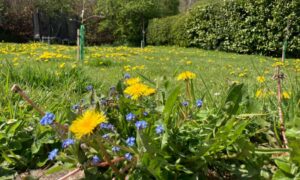
Once upon a time, an unkempt front lawn could have landed you in trouble with the neighbours. But now, councils are telling UK households to put away their lawnmower for No Mow May.
The one-month celebration of unmown gardens and parks was started in 2019 by the nature charity Plantlife, which encourages people to let grass and wildflowers grow and identify any interesting plants that spring up from the lawn.
The charity says 40 local councils have signed up to leave some of their verges and parks to grow. This not only provides space for rare wildflowers but also gives habitat and food to birds and invertebrates.
Andrew Doyle, the conservation officer for road verges and green spaces at Plantlife, said: “Experiencing the biodiversity benefits and cost savings a magical month of No Mow May brings in is a glorious gateway for councils to pass through en route to the more long-term wildlife-friendly grasslands green space management our wild plants and fungi – and the ecosystems that depend on them – need to thrive, benefiting the local community and climate.”
Wandsworth council in south London is leaving 20 designated sites unmown and recommending local households do the same with their gardens. Councillors have said private domestic gardens cover 716 hectares (1,770 acres) in Wandsworth, almost 20% of the borough’s total area.
Bradford council is letting 85 green spaces go unmown around the area. A Bradford council spokesperson said: “We are looking to implement ‘no mow’ on some of our sites to sustain biodiverse area and natural preservation. We all need to do what we can to create a more sustainable district for the future.”
Councillors on the Isle of Wight say its natural heritage is an important facet of the island’s Unesco status, so protecting it by doing No Mow May makes sense.
Natasha Dix, the council’s service director for waste environment and planning, said: “Encouraging biodiversity holds significant importance for our environment. The presence of wild orchids, including the declining man orchid, green-winged orchid, southern marsh orchid, northern marsh orchid and bee orchid can brighten up liberated lawns and enhance our natural spaces.
